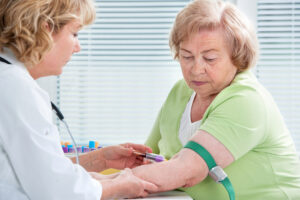What Seniors Need to Know About Shingles: Symptoms, Prevention, and Treatment

Elder Care: Senior Shingles Help in Grand Rapids, MI
Our bodies are increasingly vulnerable as we get older to a number of illnesses, including shingles. The varicella-zoster virus, which is also the cause of chickenpox, is what causes shingles, also known as herpes zoster. Although shingles can strike anyone at any age, it most commonly strikes seniors. Maintaining seniors’ health and wellbeing requires an understanding of shingles symptoms, preventative strategies, and available treatments, as well as support from elder care.
What Are the Signs of Shingles?
The classic rash of shingles usually develops as a single, painful band or stripe on one side of the body. Other symptoms typically accompany the rash, such as:
Pain: Seniors may feel pain, burning, tingling, or numbness in the affected area prior to the rash developing. This pain may last a long time after the rash has healed, ranging from moderate to severe.
Blistering Rash: This type of rash is characterized by fluid-filled blisters that rupture and form a crust. It can affect the face and eyes, as well as the torso. However, it’s important to note that the rash can occur anywhere on the body.
Flu-Like Symptoms: In addition to the rash, some seniors may also have fever, headaches, lethargy, and general malaise.
Severe Itching: Severe itching may accompany the rash and exacerbate discomfort.
How Can Seniors Avoid Shingles?
Although there is no sure-fire strategy to avoid getting shingles, seniors can lower their risk by doing the following:
Vaccination: Receiving a vaccination is the most reliable method of shingles prevention. Adults 50 years of age and older should have the shingles vaccine, commonly referred to as the herpes zoster vaccine. Shingrix and Zostavax are the two vaccinations currently on the market. The recommended vaccine is Shingrix because it provides more effective and durable protection.
Healthy Lifestyle: Upholding a healthy way of living helps boost immunity and lower the chance of developing shingles. Seniors should make an effort to control their stress, consume a balanced diet, exercise frequently, and get adequate sleep. With elder care by their side, they can gain the help they need to make the best choices for their health.
Avoidance of High-Risk Situations: Due to the high contagiousness of the varicella-zoster virus, seniors should refrain from intimate contact with those who are afflicted with shingles or chickenpox.
Options for Shingles Treatment
If shingles strike seniors, getting treatment quickly is crucial to reducing symptoms and avoiding complications. Possible courses of treatment options include:
Antiviral Drugs: If taken within 72 hours of the rash developing, antiviral medications can help lessen the intensity and length of shingles.
Pain Management: Ibuprofen and acetaminophen, two over-the-counter pain medications, can help reduce discomfort. Prescription painkillers or topical therapies might be required in some circumstances.
Calamine Lotion or Oatmeal Baths: These two methods can help reduce irritation and encourage healing.
Rest and Relaxation: Until the rash heals, seniors who have shingles should rest and stay away from activities that could make their symptoms worse.
For seniors, shingles can be a painful and annoying ailment, but its effects can be reduced with knowledge, precautions, quick treatment, and the support elder care can bring. Seniors who develop shingles symptoms should seek medical assistance, emphasize getting vaccinated, and lead a healthy lifestyle. Seniors can live longer and have a higher quality of life by adopting preventative measures to safeguard their health.
Sources: Source 1 | Source 2 | Source 3
If you or someone you know needs help with elderly care in Grand Rapids, MI contact Gauthier Family Home Care. We provide quality and affordable home care services in our community. Call us at (616) 258-2300 for more information.
- Ensuring a Smooth Transition From Hospital to Home - June 4, 2025
- Caregiver of the Month – June 2025 - June 2, 2025
- Common Sense Summer Tips for Seniors to Help Them Beat the Heat - May 28, 2025

